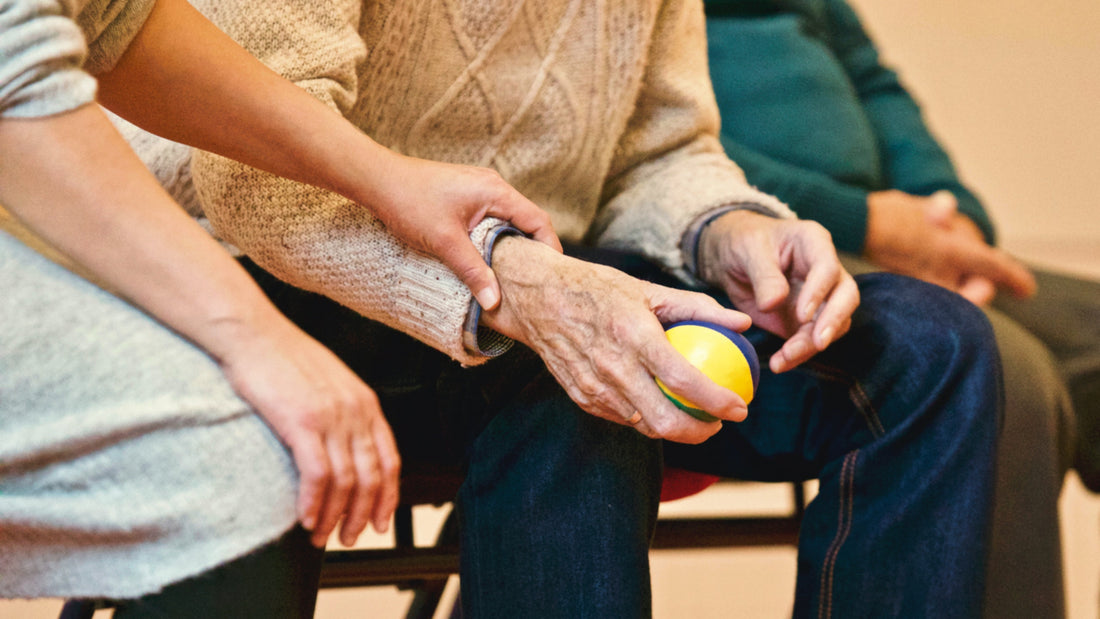Alzheimer's disease is a kind of dementia that impairs memory, thinking, and behavior. Eventually, the symptoms become severe enough to interfere with daily activities. It is a gradual condition that begins with modest memory loss and may proceed to loss of capacity to converse and respond to the surroundings.
It can have a significant impact on a person's capacity to carry out everyday duties. Alzheimer's disease is responsible for 60-80% of all dementia cases. It is not a natural component of the ageing process. The most significant known risk factor is growing age, and the majority of Alzheimer's patients are 65 and older. Alzheimer's disease is called younger-onset Alzheimer's if it strikes someone under the age of 65. Younger-onset Alzheimer's disease is also known as early-onset Alzheimer's disease. People who get Alzheimer's disease at a younger age might be in the early, medium, or late stages of the disease.
Alzheimer's disease worsens with time. It is a degenerative illness in which dementia symptoms deteriorate steadily over time. Memory loss is moderate in the early stages of Alzheimer's, but as the disease progresses, individuals lose the capacity to converse. Alzheimer's disease is the sixth most common cause of mortality in the United States. A person with Alzheimer's disease lives 4 to 8 years following diagnosis on average, but can survive up to 20 years depending on other circumstances.
Alzheimer's disease usually begins in the area of the brain that affects learning. There are 100 billion nerve cells in the brain. Each nerve cell links to a large number of others to build communications systems. Group of nerve cells perform certain functions. Some are engaged in reasoning, learning, and remembering. Others assist us in seeing, hearing, and smelling. People who are experiencing memory loss or other symptoms of Alzheimer's disease may find it difficult to identify that they will have a problem. Symptoms of dementia is more visible to family members. Earlier diagnostic and intervention methods are vastly improving, and treatment choices and supports available can significantly enhance quality of life.
Medical treatment can enhance the quality of life for people with Alzheimer's disease and their caretakers. Alzheimer's disease presently has no recognized cure. The treatment focuses on various areas:
-
Assisting people in maintaining their brain health.
-
Taking care of behavioral symptoms
-
Symptoms of the illness are slowed or delayed.
As the illness progresses, people with dementia may become restless or develop fidgeting behaviors. Fidget toys or twiddle muffs may be a beneficial technique to calm a person or give them something to do with their hands in some instances. You've probably heard of Fidget toys. if you have school-aged children or grandchildren. Originally advertised as a tool to assist persons suffering from ADHD or anxiety in remaining calm and focused, they have subsequently become enormously popular solely for their entertainment factor.
A fidget toy is a toy that a person may hold in their hands to keep them focused on what is going on around them. They are widely employed for youngsters who have difficulty studying, but they have also been shown to be good for elderly living with cognitive impairments. Fidget toys exist in a variety of shapes and sizes, and they may be a great alternative to restless or disruptive behavior. Because symptoms vary from person to person, a fidget toy recommended by another caregiver may not work for your loved one. They are hand-held, tiny, flat gadgets with a ball bearing in the middle. They are made to spin effortlessly between the user's fingers or while sitting on a table top. Recently, there has been some research exploring the effectiveness of Fidget toys in the treatment of Alzheimer's disease and dementia. While not all patients have showed the same degree of interest, preliminary results reveal that they have the potential to alleviate some of the symptoms associated with dementia and ageing in general. They may help to relax the mind. Many persons suffering from Alzheimer's or dementia get anxious. They can assist to calm them down and provide them with a simple pastime to focus on. They have the ability to occupy the hands. They are an excellent option for people who want to do something with their hands but aren't sure what. They can aid in the preservation of hand strength. Many elders suffer from arthritis and overall hand weakness. Using a Fidget cube may assist to build and maintain dexterity in the hands and fingers. Fidget cube may be used without bothering others. As a result, they are an excellent pastime for folks who share living space at a senior care facility. They are also an excellent choice for waiting rooms.
They can facilitate interactions between grandkids and grandparents. Because many youngsters are obsessed with Fidget toys, they'll think it's really funny if grandmother or grandpa is playing with the same gadget as they are. We all need to play, regardless of our age. They are are a simple approach to provide a fun exercise to elderly suffering from Alzheimer's or dementia.
The wonderful thing about this is that they immerse us in the present moment. When we become interested with this, we devote our entire focus to play and investigation. Anything that does this cannot but be useful. Another activity that may legitimately be called a fidget cube for Alzheimer's sufferers is the Brainpaths, which gives excellent brain stimulation by tracing a groove in the disc with the fingertips. The nerves in the fingertips provide a signal to the brain.
Fidget toys have recently become quite popular and are an excellent option. Fidgeting are very genuine signs of Alzheimer's or dementia that some individuals display. One method for calming them down is to refocus their fidgeting with some fascinating sensory toys. They say, the active the hands, the more engaged the mind.
Fidget toys may calm the hands and engage the minds of Alzheimer's patient
Humans, regardless of age, require physical activity and play. It is extremely crucial for the elderly and those suffering from dementia or Alzheimer's disease to be involved in life, in whatever capacity. It is the newest toy to hit the market. Playing with a Fidget toys, on the other hand, is just a technique for many individuals to maintain focus and involved in a joyful pastime. Playing with a spinner might be comforting to a dementia patient's restless mind. The individual may be unaware of the therapeutic advantages, yet they exist.
Fidget spinners are composed of plastic and have stainless steel or ceramic bearings that allow for a range of spin times. They operate quietly, making them ideal for the aged who may share rooms in a nursing home or rehabilitation center where others may be disturbed by noise. Because they are compact, they can be stored in a pocket, bedside table, or purse and utilized whenever and wherever desired, making them an excellent pastime for doctor's office waiting rooms or times when sleep is difficult to come by.
One feature of fidget cubes that I appreciate is how well they fit in your hand. Arthritis and weakness become increasingly frequent as people age. Hand exercises provide the additional therapeutic advantage of keeping fingers and hands stronger and more nimble, which may help keep pain and stiffness at bay. A fidget spinner can be used by grasping it in one hand and tapping it lightly with the other. It may also be used on a table's surface.
Alzheimer's disease and other kinds of dementia that impair cognitive functioning, perceptual acuity, and social capacities leave a person shaken and frequently agitated. Consider this as the condition develops, the individual with Alzheimer's disease regains childish traits that cause youngsters to perceive the world as magical. Because children do not have a past, everything is fresh to them. However, for someone with Alzheimer's, the world might be filled with freshness since the condition causes him to forget history. When you give the patient toys, he or she will be charmed. When a patient's speech is unclear and he or she is fatigued, engaging them with sensory toys will assist relieve exhaustion and make them considerably more conversant. Toys that are stage-appropriate will do a better job of retaining the interest and attention of the person with Alzheimer's.
However, loved ones of patients with Alzheimer's have expressed reservations regarding the use of therapeutic toys. It's normal to be concerned when a parent or a cherished grandparent regresses into a youthful state. Unfortunately, this is what a person suffering from dementia experiences. Stage-appropriate activities, such as playing with fidget toys, improve the quality of life in people with dementia. Toys should only be rejected if the person in charge disagrees to their use.
Fidget toys, like Fidget cube, are designed to keep the patient's hands and mind busy. It relieves the user's tension and anxiety. A fidget cube is about three times the size of a dice and is composed of the same material as a spinner. It features buttons, gears, and switches all around the six sides that provide hours of fiddling delight. While fidgeting has been demonstrated to aid with focus. Simple fidgeting toys like textured putty or squeezy balls that allow for silent, non-distracting movement appear to be beneficial for the Alzheimer's and Dementia’s patient.
Reduce stress
Restlessness is referred to as fidgeting. Patients suffering from neuromuscular problems are frequently observed to be agitated. This might be due to a variety of factors, including impatience, uneasiness, boredom, and worry.
Provide a diversion from ruminating
Fidget toys have been found to be distracting. In Alzheimer's sufferers, the spinners assist divert the brain from items that were generating stress. That divert attention, and this divert attention has a direct impact on ruminating. Meditation also provides a release of stress hormones to the brain cells.
Fidgets for Influence Motor Control
Motor nerves are located in the central nervous system and are responsible for causing effectors to respond. They convey signals to our muscles or hormones, causing them to react to any external stimulation. Patients suffering from nerve illnesses such as Alzheimer's disease lose motor control. Fidget toys can assist individuals in recovering control and so improving the disease's state. Fidgeting is a motor sensation in and of itself. There are several types of fidgeting. One of them includes the recurrence of a certain activity as a result of an external stimulation. The behavior is performed so many times that it becomes the person's habit.
Fidget toys Improve Concentration and Attention
Toys and technologies that enable person with Alzheimer's to fidget can enhance their attentiveness. They can improve the brain's capacity to notice objects, respond to particular stimuli, and provide a variety of other functions. They have the ability to divert your attention away from the sources of your tension and agitation. Some nations prohibit the use of Fidget toys. It's because they were discovered to be a source of diversion from the outside world.
It is critical for persons suffering from dementia or Alzheimer's disease to participate in some form of activity. As a result, some people even prescribe the famous fidget toy to dementia patients. When dementia patients get agitated, it might be difficult to quiet them down. Fidget toys are claimed to help soothe an unsettled mind by giving it something else to focus on. Some dementia patients have a limited range of abilities. The advantage of Fidget toys is that they are easy to use.
It is concluded that Fidget toys can assist patients in feeling less worried and anxious. They have no detrimental effects on adult Alzheimer's patients, and there is no reason to avoid using them. If the spinner disturbs those around you or distracts you from your job, you have more than enough reasons not to use it. If you have an older loved one at home who has Alzheimer's, get them a Fidget toys, and it would be a great way for them to spend time doing something useful for their health.

